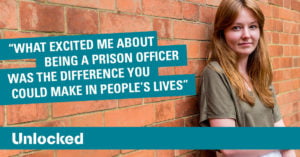A professional role
This is a guest post by Natasha Porter (@NPorter_) Chief Executive and Founder of Unlocked Graduates.
Prison workforce inquiry
On behalf of Unlocked Graduates, I gave evidence to the Justice Select Committee on the prison operational workforce inquiry this week and am delighted this is an area Parliament are looking at. The role is hugely undervalued, and this has got to change if we are to be serious about addressing recruitment and retention challenges.
I just want to focus on one aspect of the inquiry: how much training does a prison officer need? This depends how important and complex the job is. If we look to other frontline workers dealing with the people who end up in prison at other points in their lives, such as social workers and teachers, even probation officers and the police, they all have an intensive qualification period followed by ongoing professional development to keep up to date with the most recent research in their work.
Is the prison officer important?
Undoubtedly, yes. Relationships between prisoners and frontline staff are at the heart of prison. Prisoners have stories of the profound difference “good” and “bad” officers have had on their time in custody. Nelson Mandela talked about the person who decides whether he has a blanket or not on a cold winter’s night. In recent times prisoners have told me about prison officers who can be relied on to help, or who make sure vulnerable prisoners aren’t taken advantage of.
Good prison officers are on the frontline, supporting prisoners to break cycles of reoffending. They encourage attendance at education, support family ties, signpost towards employment post release. Rehabilitation isn’t done to somebody, but supportive and skilled professionals can plant important seeds, and be a key part of someone’s rehabilitative journey.
Is the prison officer job complex?
Again, undoubtedly yes. Those who end up in prisons increasingly have complex histories of challenge and disadvantage. One in four has been care, nearly two thirds are functionally illiterate, many have substance dependency issues. At every other point in their lives, social workers, teachers, and doctors are deployed by the state, all with more training and higher bars to entry.
Prison is surely where we need our greatest professional expertise. This is where we need to entice our most masterful relationship builders, including those social workers and teachers who engage the most disengaged with tenacity and care.
And yet, we give prison officers less training, less development, less support. And we hold their jobs in lower regard.
During the pandemic there was very little mention of the incredible sacrifice of prison officers. A Tesco in Leicestershire giving free coffees to key-workers during COVID had a sign to tell prison officers they were not included. This would have included, for example, the prison officer living in a tent in his garden so he could continue to work on the landings.
Excellence required
We need to be clear that the prison officer job requires excellence. As far as I know, there’s no evidence that this correlates with prior academic qualifications, but there is a skill set good prison officers have: excellent relationship building, a sense of possibility, moral courage. There is a baseline we need to recruit to, but there also needs to be more deliberate training over a much longer period.
Professional standards would start to give clarity and status, and make it clear that being a prison officer is much more than just locking doors and counting people.
Of course, there are procedural aspects of a prison officer’s job, like how to search a cell thoroughly and safely and how to use a radio correctly. We find with good initial training and ongoing support, mastery of these takes about six months. But this is just a part of prison officer’s training. Only once these are mastered that the true complexity of the role can be explored, but what is truly complex is the relational aspect of the role.
A complex role
So, let’s consider a part of a prison officer’s job which appears relatively simple: searching a person. What makes this complex is not the searching procedure. What makes this complex is that there is a person being searched.
A person who has been sexually abused and doesn’t want to be touched.
A person who is concealing a weapon.
A person who has been singled out for searching unfairly by those in uniform before.
A terrified child visiting a parent.
Searching a line of prisoners coming back from work, hungry for lunch, trying to follow correct procedure while colleagues rush their lines through on either side of you. Those in your line getting angry with you because you are taking so long by being diligent.
In every one of these examples completing a straight-forward job of searching is not the hard bit. It is holding relationships with the human beings in front of you that is complex, skilful and requires practice and reflection. It is also doing the job expertly and professionally, recognising the huge risks which require absolute precision in how the job is carried out. There may be a requirement to search, and this is a crucial aspect of the officer role, but there is much in common with a teacher or social worker. They also have to hold boundaries and maintain a safe environment for everyone within it, but alongside this needs to be deep care and relationships built with this care at the heart.
This is why prison officers need standardised, high quality ongoing training, and this is what makes their role a profession and requiring professional standards.
Thanks to Andy Aitchison for kind permission to use the header image in this post. You can see Andy’s work here







One Response
If you are realistic about issues regarding training, there needs to be a rational and truthful scrutiny process of not just the training, but who is delivering this training.
It is clear standards, quality and outcomes are getting worse and no one seems to be acknowledging the issues.
Time to speak open and truthfully about matters which need addressing, continuing in the same pattern will only end in embarrassment for all parties involved and the service user.